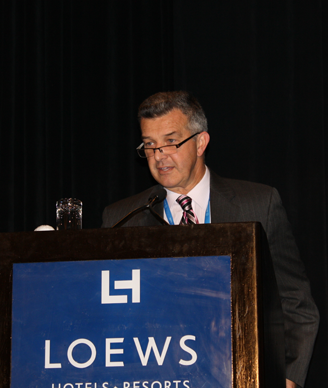Rindopepimut Vaccine With Bevacizumab Ups Survival in Recurrent Glioblastoma
The immunotherapeutic rindopepimut with bevacizumab yielded a significant survival improvement in relapsed glioblastoma patients with a EGFRvIII mutation.
David A. Reardon, MD, speaking at the 2014 SNO Annual Scientific Meeting.

The immunotherapeutic rindopepimut along with bevacizumab yielded a significant improvement in survival outcomes at an interim analysis of a phase II trial of patients with relapsed glioblastoma and the EGFRvIII mutation. Results of the ReACT trial were presented at the Society for Neuro-Oncology Annual Scientific Meeting in Miami.
“This was a very exciting finding,” said David A. Reardon, MD, of Dana-Farber Cancer Institute in Boston, during a press conference. “This is the first clear signal from a randomized trial in recurrent patients… where we have a confirmed survival benefit.”
The EGFRvIII mutation is a tumor-specific oncogene expressed in about one-third of primary glioblastoma. The rindopepimut vaccine consists of an EGFRvIII peptide and generates a specific immune response against glioblastomas that express EGFRvIII. Importantly, previous work has shown that those patients expressing the variant have poorer long-term survival than those who do not. “This is a poor outcome in an already poor outcome disease,” Reardon said.
In the new study, two groups were treated: bevacizumab-refractory patients all received the vaccine along with bevacizumab (53 patients); bevacizumab-naïve patients were further divided into those receiving the vaccine along with bevacizumab (35 patients) and control patients receiving only bevacizumab (37 patients).
Reardon said that the rindopepimut/bevacizumab combination has been generally well tolerated, with no unexpected toxicities. No serious adverse events have been attributed to the vaccination.
The primary endpoint was 6-month progression-free survival (PFS); 27% of bevacizumab-naïve patients who received rindopepimut had not progressed at 6 months, compared with only 11% of control patients (P = .048). The overall survival (OS) was also better, with a median of 12 months on the vaccine and 8.8 months without it, for a hazard ratio of 0.47 (95% confidence interval, 0.25–0.91; P = .0208). Reardon said that the data are still maturing, and because some have still not progressed, he guesses that the PFS and OS data will improve even further as the study is completed.
Among the bevacizumab-refractory patients, only two of the initial 25 patients were progression-free at 6 months. Of the full 53-patient cohort, the median PFS was 1.8 months and the median OS was 5.1 months.
Reardon said that a potential biomarker was also found in this trial. Between one-third and one-half of patients developed particularly strong humoral immune responses, and those patients tended to do better in terms of survival.
Patrick Wen, MD, also of Dana-Farber Cancer Institute, discussed the study during the press conference and agreed that “this is potentially a really important study. This is a positive trial in recurrent glioblastoma using this vaccine, and it potentially has a lot of implications for this subset of patients.”
Phase III trials involving EGFRvIII-positive patients are ongoing now, and Reardon concluded that these positive results support further study of rindopepimut in newly diagnosed patients, as well as recurrent glioblastoma patients.